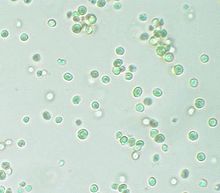Eustigmatophyceae
| Eustigmatophytes | |
|---|---|
 |
|
| Nannochloropsis sp. | |
| Scientific classification | |
| Domain: | Eukaryota |
| (unranked): | SAR |
| (unranked): | Halvaria |
| Superphylum: | Heterokonta |
| Division: | Ochrophyta |
| Class: |
Eustigmatophyceae Hibberd & Leedale, 1971 |
| Order | |
Eustigmatophytes are a small group (12 genera; ~41 species) of eukaryotic algae that includes marine, freshwater and soil-living species.
All eustigmatophytes are unicellular, with coccoid cells and polysaccharide cell walls. Eustigmatophytes contain one or more yellow-green chloroplasts, which contain chlorophyll a and the accessory pigments violaxanthin and β-carotene. Eustigmatophyte zoids (gametes) possess a single or pair of flagella, originating from the apex of the cell. Unlike other heterokontophytes, eustigmatophyte zoids do not have typical photoreceptive organelles (or eyespots); instead an orange-red eyespot outside a chloroplast is located at the anterior end of the zoid.
Ecologically, eustigmatophytes occur as photosynthetic autotrophs across a range of systems. Most eustigmatophyte genera live in freshwater or in soil, although Nannochloropsis contains marine species of picophytoplankton (2 → 4 μm).
The class was erected to include some algae previously classified in the Xanthophyceae.
...
Wikipedia
